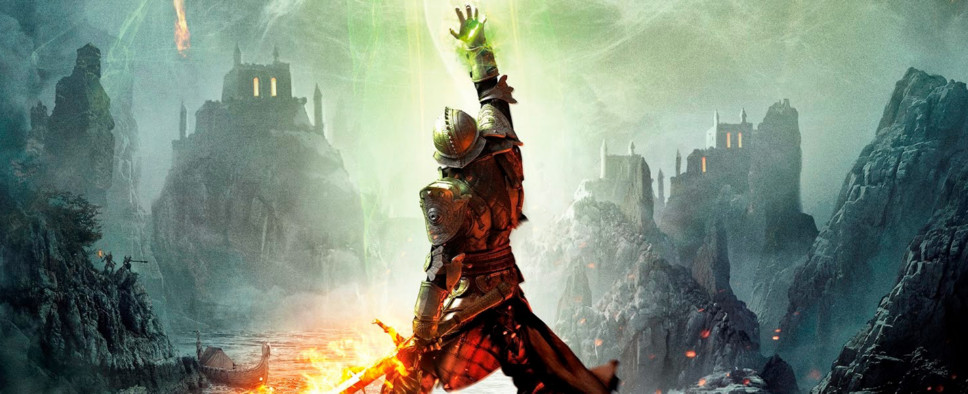Dragon Age: Inquisition + Jaws of Hakkon DLC Review
-
Category: ReviewsHits: 21101

Article Index
Speaking of consequences, the way Dragon Age: Inquisition handles choices is interesting. Almost every big story mission ends with a choice of some sort, and some of them are enormous in scope. It's possible to single-handedly replace the political leadership in Orlais, for example, but the choice falls flat because the player isn't offered valid reasons to care about Orlais. True, some of the zones in the game are part of Orlais, but the change in leadership is unlikely to affect the lives of the people there directly. In Dragon Age: Origins the ending slides made sense because they involved people and communities you had interacted with frequently during the game.
Dragon Age: Inquisition does that too at times, and that's when it works. Being asked to decide the fate of an old character works because there's history and weight behind the interaction, but also feels manipulative, because it takes into account the player rather than the character that is played. Which is why ultimately the game's best choices always involve the characters met while adventuring. Some of these choices are naturally implemented in quests (the companion quests are a highlight because of their story content and all end on a satisfying note), other play out as "Judgments", where the Inquisitor can get to decide the fate of a captured character.
There is on exception to this general trend, however. In an otherwise workman-like game, BioWare managed to find brilliance in an unlikely place. At the end of the game, a new Divine (a figure much like the Catholic Church's Pope) is chosen for the Chantry, among a selection of candidates that are all part of the Inquisitor's close circle. The fact that all the best candidates are people that the Inquisitor knows isn't particularly believable, but it makes for a very interestingly constructed choice. Players are required to weight their personal interest with their ideological stance on many issues, and ultimately it's their past actions throughout the game that determine who becomes the new Divine.
A really interesting scenario. The only one that made me feel like I was playing a "next-generation BioWare RPG" rather than a single-player MMO with a few minigames borrowed by Assassin's Creed. The less is said about those, the better.
Character Progression, Itemization and Combat
Many fans mourned the loss of the RPG progression mechanics from Mass Effect in its sequels, me among them, but there's something to be said for a series that has a confident direction. After the original title, BioWare decided to focus on refining the shooting mechanics of the series. The choice was likely based on fan feedback, but it was something they always stuck with. It's true that they implemented some more granular character building with Mass Effect 3, but it was never done at the expense of the gunplay, which was actually fine-tuned even further in the final game of the trilogy.
The Dragon Age series would benefit enormously from a similar clarity in direction. Dragon Age: Origins was very much inspired by the Infinity Engine titles, but the smaller party, slower pace, and abilities and progression inspired by MMOs made it a different take on RTwP party-based combat altogether. Dragon Age II sped up the pace and catered mostly to the console crowd (the first Dragon Age's console versions are notorious for being poor), though it also made a few good changes to the ability progression and combo set ups. Dragon Age: Inquisition is its own beast. It takes aesthetic cues from both titles, sure, but it doesn't really play like either.
For example, the attributes from Dragon Age: Origins and Dragon Age II are back, but there's no manual way to raise them anymore. Instead, certain abilities and equipment pieces grant bonuses to the attributes. The same three classes are back, and they are all designed to be played very actively, because the game is played in third-person by default. It's possible to open a tactical camera that stops time and gives the player a chance to give orders to every member of the party, but playing the whole game using that mode would be impossibly tedious, so it's best reserved for the hardest encounters.
It doesn't help that the tactical camera isn't very well implemented. It gets stuck in geometry often, and it makes it impossible to properly use a number of abilities that require proper timing. Which leads me to another of this game's problems: there is a conflict between the game's twitchier, action-y side and the attempts at being tactical. Abilities that emphasize positioning generally work better in the tactical camera, while abilities that require reflexes are better executed from third person, almost as if they belonged to two different combat systems. Playing solely in third person isn't a great solution either, though. The party AI in Inquisition isn't good, and the behaviour options are very disappointing when compared to the Tactics menus of Origins and II.

